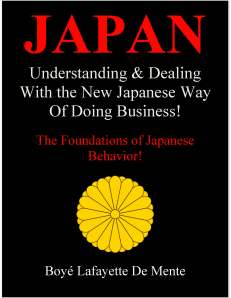The New Japanese Way of Doing Business!
CHALLENGES AND OPPORTUNITIES!
Dramatic changes have occurred in Japan’s way of doing business since the late 1980s and early 1990s when its economic juggernaut was literally stopped in its track by the rapid rise of global competition and the fact that the Japanese real estate and financial industries copied American practices that were doomed to failure.
A new book by author Boyé Lafayette De Mente, JAPAN – Understanding & Dealing with the New Japanese Way of Doing Business, details how the Japanese way of doing business has morphed into a hybrid of traditional culture-based elements and Western practices, and provides insights in how to deal effectively with this new reality.
Known for his pioneer business related books on Japan—going back to Japanese Etiquette & Ethics in Business, published in 1959, and How to Do Business in Japan, published in 1962—De Mente’s new book provides foreign companies with guidelines for competing with the Japanese on the domestic as well as the international front.
“Some of the traditional elements of Japanese business that were the foundation of the country’s astounding rise from the devastation of World Word II to become the world’s second largest economy between 1952 and 1970 have not changed.
“But other aspects that reflect both Western practices and Japan’s resent-day high-tech-based social culture present new challenges as well as opportunities, De Mente says.
He adds that the changes Japanese businesses have made and are ongoing ensure that they will continue to play a major role in the world’s economy.
His books are available in digital and printed formats from Amazon.com, and from the Barnes & Noble bookstore chain as digital Nook books.
_________________________________________
Boyé Lafayette De Mente has been involved with Asia since the late 1940s as a member of a U.S. intelligence agency, journalist and editor. He is a graduate of Jōchi University in Tokyo, Japan and Thunderbird School of Global Management in Glendale, Arizona, USA. In addition to books on the business practices, social behavior and languages of China, Japan, Korea and Mexico he has written extensively about the plague of male dominance and the moral collapse of the U.S. and the Western world in general. Recent books include: CHINA Understanding & Dealing with the Chinese Way of Doing Business; JAPAN Understanding & Dealing with the NEW Japanese Way of Doing Business; AMERICA’S FAMOUS HOPI INDIANS; ARIZONA’S LORDS OF THE LAND [the Navajos] and SPEAK JAPANESE TODAY – A Little Language Goes a Long Way! To see a full list of his 60-plus books go to: www.authorsonlinebookshop.com. All of his titles are available from Amazon.com.
AMAZING JAPAN! – Attractions and Pleasures
Most Westerners who visit Japan for no more than three or four days are forever changed by the experience because of the extraordinary sensual and visual attractions and because of the unique Japanese behavior and lifestyle.
This book identifies and describes the primary factors that make Japan such a fascinating and seductive place, including the amazing number and variety of venues that are designed specifically to pleasure the body, mind and spirit.
Not surprising to old Asia hands, the children, the girls and the young women are major contributors to the appeal of Japan….a factor I have addressed in WHY ORIENTAL GIRLS ATTRACT WESTERN MEN!
There are so many aspects of Japan that never fail to intrigue foreigners that they cannot all be adequately described….they have to be experienced!
______________________

 ___________________
___________________
Boyé Lafayette De Mente has been involved with Asia since the late 1940s as a member of a U.S. intelligence agency, journalist and editor. He is a graduate of Jōchi University in Tokyo, Japan and Thunderbird School of Global Management in Glendale, Arizona, USA. In addition to books on the business practices, social behavior and languages of China, Japan, Korea and Mexico he has written extensively about the plague of male dominance and the moral collapse of the U.S. and the Western world in general. Recent books include: CHINA Understanding & Dealing with the Chinese Way of Doing Business; JAPAN Understanding & Dealing with the NEW Japanese Way of Doing Business; AMERICA’S FAMOUS HOPI INDIANS; ARIZONA’S LORDS OF THE LAND [the Navajos] and SPEAK JAPANESE TODAY – A Little Language Goes a Long Way! To see a full list of his 60-plus books go to: www.authorsonlinebookshop.com. All of his titles are available from Amazon.com.
Merging of Man and Machine Takes Giant Step Forward!
Boyé Lafayette De Mente
TOKYO—Science fiction is rapidly becoming reality—an incredible phenomenon that is both fascinating and frightening. I have commented before on the remarkable advances Japanese robot scientists have made in “humanizing” their creations. But their latest step in robotics goes well beyond that point.
Japanese scientists have now created a robot that can read the mind of a monkey that is 10,000 kilometers away on a different continent! That’s right—a monkey…some 7,000 miles from Japan!
In early 2008 the Advanced Telecommunications Research Institute International [ATR] in Kyoto, Japan joined with scientists at Duke University in the U.S. in connecting the brain of a monkey with a humanoid robot in the Japanese laboratory. The robot “read the mind” of the monkey and duplicated the monkey’s movements while it was still thinking about moving!
That’s right! There was no time lag in the movements of the robot. It followed the brain waves of the monkey and began each movement at precisely the same time. When the monkey was told to move and thought about it before starting to move the robot performed the movement first!
ATR research supervisor Mitsuo Kawato says this new brain-machine interface has already gone beyond monkey-robot and computer experiments, not only making it possible in the near future for people to exercise mind-control over robots but also over a wide variety of other machines, from television sets and computers to household appliances.
Kawato explains that when people focus their attention or move their bodies discernible changes take place in their brainwaves and in the flow of blood patterns in their brains. This data can be monitored to reveal the intentions of the individuals and translated into commands that can be recognized by computers, robots and other machines.
He adds that using brain-machine interface technologies that will eliminate the need for human beings to physically operate machines could transform the way people live and work—an understatement to say the least.
Also in 2008 researchers at Keio University in Tokyo wired a man who had been injured and couldn’t move his arms or legs to a computer. With several hours of training, the man was able to operate programs on the computer by thought-control alone!
Similar research is also taking place at several other universities in the U.S., where the process is known as Brain Computer Interface [BCI], with equally remarkable results.
Keio’s Junichi Ushiba and his colleagues have also developed a way for people to project their minds into a virtual world “seeing” themselves and experiencing the feelings of flying, mountain-climbing, etc., just by thinking about these actions.
Ushiba says that by extracting information from higher order brain activity it is possible to literally read a person’s mind—to actually see what they are thinking about. This amazing breakthrough obviously relates to the holographic programs featured on Star Trek, where members of the crew of the star ship Enterprise can enter the programs and interact with the characters in them.
In the United States, high-tech company Linden Lab is a leader in creating virtual worlds that on the order of the Enterprise’s holodeck programs.
Based in San Francisco, Linden Lab is the creator of Second Life and the virtual world platform Second Life Grid, technology used in creating virtual worlds. Second Life allows a person to experience life in a virtual world.
The opportunities offered by this technology are simply mindboggling—and I predict that sexual fantasies will soon replace violence and other action programs as the most popular simulations.
_________________________________________
Boyé Lafayette De Mente has been involved with Asia since the late 1940s as a member of a U.S. intelligence agency, journalist and editor. He is a graduate of Jōchi University in Tokyo, Japan and Thunderbird School of Global Management in Glendale, Arizona, USA. In addition to books on the business practices, social behavior and languages of China, Japan, Korea and Mexico he has written extensively about the moral collapse of the U.S. along with books on his home state of Arizona. To see a full list of his books go to: www.authorsonlinebookshop.com. Recent books include: CHINA Understanding & Dealing with the Chinese Way of Doing Business; JAPAN Understanding & Dealing with the NEW Japanese Way of Doing Business; AMERICA’S FAMOUS HOPI INDIANS; ARIZONA’S LORDS OF THE LAND [the Navajos] and SPEAK JAPANESE TODAY – A Little Language Goes a Long Way!
The Importance of Dealing with Japan’s Dynamic Diligence Factor!
Boyé Lafayette De Mente
TOKYO—In 1953 as a fledgling journalist in Tokyo I went to the dean of foreign correspondents in Japan [the Far Eastern Bureau Chief for a major London newspaper] and asked him if he thought it would be a good idea for me to stay in Japan—if there would be opportunities for me to build a worthwhile career, or if I should go home.
His instant response was: “Japan is never going to amount to anything! Go home!”
Just ten years later Japan was already on the verge of becoming the second largest economy in the world…and fortunately, I had not taken the famous correspondent’s advice.
There are several reasons why Japan was able to recover so rapidly from the destruction of World War II. Two of these reasons are especially outstanding. First was the hundreds of millions of dollars pumped into the Japanese economy by the Allied Forces during the Occupation of the country from September 1945 to the spring of1952. And second was the fact that the United States bought hundreds of millions of dollars worth of supplies from Japan during the Korean War [1950-1953].
An obvious third factor in why Japan was able to become an economic superpower by 1970 was the fact that from 1948 on Japanese manufacturers [that had sprouted up like weeds following the end of WW II] were inundated by American importers who began flocking into the country by the thousands seeking consumer goods of all kinds at cheaper prices, giving this mass of new Japanese companies total access to the American market. [By the mid-1950s Sears had 65 buyers permanently stationed in Tokyo alone.]
But undergirding all of the effort that went into the creation of the world’s most efficient export industry were a litany of national characteristics that made the Japanese both unique and formidable competitors.
One of the most important of these deeply ingrained cultural characteristics is subsumed in the word monozukuri (moe-no-zoo-kuu-ree)…a word that is so new it does not appear in most [if any!] dictionaries of Japanese words.
The applied meaning of monozukuri evolved from the meanings of its parts, including original thinking, the application of extraordinary efforts to achieve goals, craftsmanship, and diligence—all of which have traditionally been readily discernable in the character of the Japanese.
While all of these traits have made vital contributions to the economic success of the Japanese the one that is the most visible—at least to foreigners—is their built-in diligence.
For me, this remarkable trait was underscored in the 1970s when I was at a New York hotel for a business meeting that included a number of Japanese managers. I came down to the hotel restaurant before 6 a.m. for an early breakfast and found myself standing in line behind the Japanese.
I commented in Japanese to the man next to me that he and his co-workers were starting the day early. He replied with great emphasis and without smiling: Kimben na Nihonjin desu kara! [“Because we are diligent Japanese!”]
The level of diligence in Japan is far higher than in most countries, and it expresses itself in everything they do…from the finish and the packaging of the products they make to the meticulous attention they pay to forging and maintaining their business contacts.
Many of the failures of American companies and U.S.-made products in Japan have been because they did not live up to the diligence standards of the Japanese.
Monozukuri is a concept that must be taken to heart by any company wanting to succeed in the Japanese market.
_________________________________________
Boyé Lafayette De Mente has been involved with Asia since the late 1940s as a member of a U.S. intelligence agency, journalist and editor. He is a graduate of Jōchi University in Tokyo, Japan and Thunderbird School of Global Management in Glendale, Arizona, USA. In addition to books on the business practices, social behavior and languages of China, Japan, Korea and Mexico he has written extensively about the moral collapse of the U.S. along with books on his home state of Arizona. To see a full list of his books go to: www.authorsonlinebookshop.com. Recent books include: CHINA Understanding & Dealing with the Chinese Way of Doing Business; JAPAN Understanding & Dealing with the NEW Japanese Way of Doing Business; AMERICA’S FAMOUS HOPI INDIANS; ARIZONA’S LORDS OF THE LAND [the Navajos] and SPEAK JAPANESE TODAY – A Little Language Goes a Long Way!







